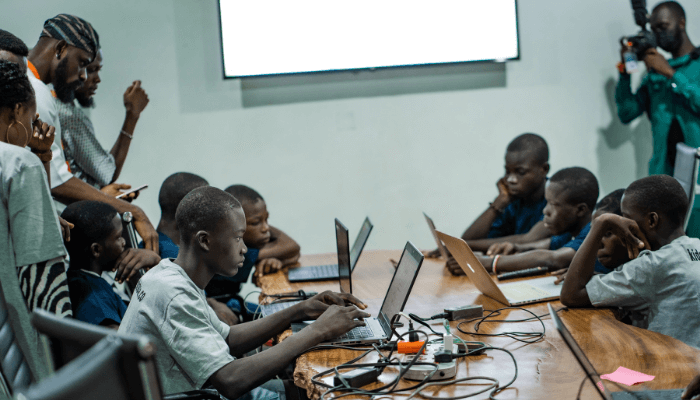Press Releases
Transforming Education in Nigeria through Tech: A Look at the Top Edtech Companies, including uLesson, AltSchool Africa, Codepym, ScholarX and Edukoya -By George
The platform also parents to view certain details about their children/ward as well as pay fees on the platform. Considering that not all parents are tech-savvy, these details can be accessed via text, email or the web platform itself.

Nigeria is one of the fastest-growing tech hubs in Africa, with a thriving tech industry and a growing number of startups. The country has a large and young population, a rapidly expanding economy, and a growing demand for technology-based solutions to its many challenges.
Some of the most significant areas of growth in the Nigerian tech industries are e-commerce, fintech, edtech and much more.
The educational sector in Nigeria has seen significant growth in recent years, thanks in part to the adoption of technology. With a population of over 200 million people, Nigeria has a huge demand for education, and technology has helped to bridge the gap between the number of students and the limited resources available to schools and universities.
So without further ado, here are the Top 5 edtech Companies in Nigeria for the year 2023.
- uLesson
uLesson is an edtech startup based in Nigeria that aims to provide affordable and high-quality educational content to students across Africa. The company was founded in 2019 by Sim Shagaya, a Nigerian entrepreneur and founder of Koga, a leading e-commerce platform in Nigeria.
The uLesson provides interactive video lessons and quizzes covering a range of subjects, including math, physics, chemistry, and biology, for secondary school students. The content is developed by experienced teachers and is aligned with the Nigerian curriculum, making it relevant and useful for Nigerian students.
The uLesson platform is available as a mobile app, which can be downloaded from the Google Play Store or Apple App Store. The app allows students to access the content offline, making it accessible to students in areas with poor internet connectivity. The app also offers a variety of subscription plans, ranging from daily to annual plans, making it affordable for students from all backgrounds.
One of the key features of uLesson is its use of gamification to engage students and make learning more fun. The platform offers rewards for completing lessons and quizzes, which can be used to unlock additional content and features.
Since its launch, uLesson has received significant funding from investors, including TLcom Capital, a leading venture capital firm in Africa. The company has also partnered with schools and educational institutions across Nigeria to provide its content to students.
- AltSchool Africa
AltSchool Africa is an edtech startup that aims to transform the way education is delivered in Africa, starting with Nigeria. The company launched in 2016 as a subsidiary of AltSchool, a US-based edtech company co-founded by Max Ventilla, a former Google executive.
AltSchool Africa’s mission is to provide personalized and student-centred education to children in Africa, using technology to deliver a highly customized learning experience. The company has developed a proprietary learning management system (LMS) that used data analytics and machine learning algorithms to track student progress and provide personalised learning recommendations.
The AltSchool Africa platform provides a range of learning resources, including interactive video lessons, quizzes, and games, that can be accessed on a variety of devices, including smartphones, tablets, and laptops. The platform also offers virtual classrooms, where students can interact with their teachers and peers in real-time, and access a network of experienced educators and subject matter experts.
AltSchool Africa has received significant funding from investors, including Omidyar Network, a leading philanthropic investment firm, and Learn Capital, a venture capital firm specializing in education technology. The company has also partnered with several schools and educational institutions across Nigeria to pilot its platform and refine its approach to personalized learning.
- Codepym
While other edtech companies were trying to bring students online, Codepym is of the companies choosing a different approach. This approach is simply to bring schools online through its cloud-based platform.
Founded in 2016 by Mayowa Adebayo, Codepym is a cloud-based school management software platform. It provides more than one product, which comes with its features. To feature it down, Grad allows schools to manage report cards, fees payment, digital learning, student enrollment etc, eLibra helps manage all aspects of the library’s operations such as cataloguing and circulating materials and generating reports and much more.
As part of its digital infrastructure efforts, the company also enables interaction between teachers, parents and administrators to deliver education and means of collaborating on learners’ progress on learning goals and track and analyze learning outcomes.
The platform also parents to view certain details about their children/ward as well as pay fees on the platform. Considering that not all parents are tech-savvy, these details can be accessed via text, email or the web platform itself.
Edtech is improving the education sector in Nigeria and Codepym is at the forefront of this transformation.
- Edukoya
Edukoya burst into the scene in December and made an instant big bang with its fundraising. For an education technology startup still in Beta to raise an outstanding $3.5 million, seemingly out of the blue, that was really impressive. The fundraising represented the largest pre-seed round for an African edtech platform to date.
Founded in 2021 by Honey Ogundeyi, Edukoya’s mission is to build the world’s largest online learning platform for Africans by making high-quality learning materials and support more accessible and affordable. In essence, it wants to reinvent how African students learn in the age of mobile devices.
It hopes to achieve this by connecting African students with digital curriculum content and on-demand teachers for real-time online learning. The startup has offices in the United Kingdom and in Nigeria.
- ScholarX
Launched in Nigeria in July 2016, the ScholarX app allows users to select parameters and scroll through lists of available scholarships that match their requirements.
The startup has taken part in a host of accelerators in the last couple of years, including the Cape Town-based Injini ed-tech incubator and Google Launchpad Africa accelerator, as well as secured pre-seed funding.
2 years, it was announced as one of the grantees of the GSMA Innovation Fund for Mobile Internet Adoption and Digital Inclusion, and it will use the capital to fund key components of its project with Airtel, including platform development, content development and sourcing and early user adoption.
The initial version of the LearnAM app has been developed on KaiOS and will be available on affordable “smart-feature phones” with content in local dialects such as Pidgin English, Yoruba, Igbo and Hausa.
LearnAM provides audio and visual content to improve the digital and vocational skills of Africans so they can access decent work. It employs a 360-degree approach as it provides learning opportunities, assessment to measure competency and a marketplace that connects users to jobs, customers and apprenticeships.
ScholarX will leverage the expansive retail and digital footprints of Airtel Nigeria to deliver its skill-acquisition content.
“We are now able to embark on our quest to connect millions of unconnected people in Africa to the Internet and help them get trained in valuable skills for the new digital economy,” said Bola Lawal, co-founder and chief executive officer (CEO) at ScholarX.








